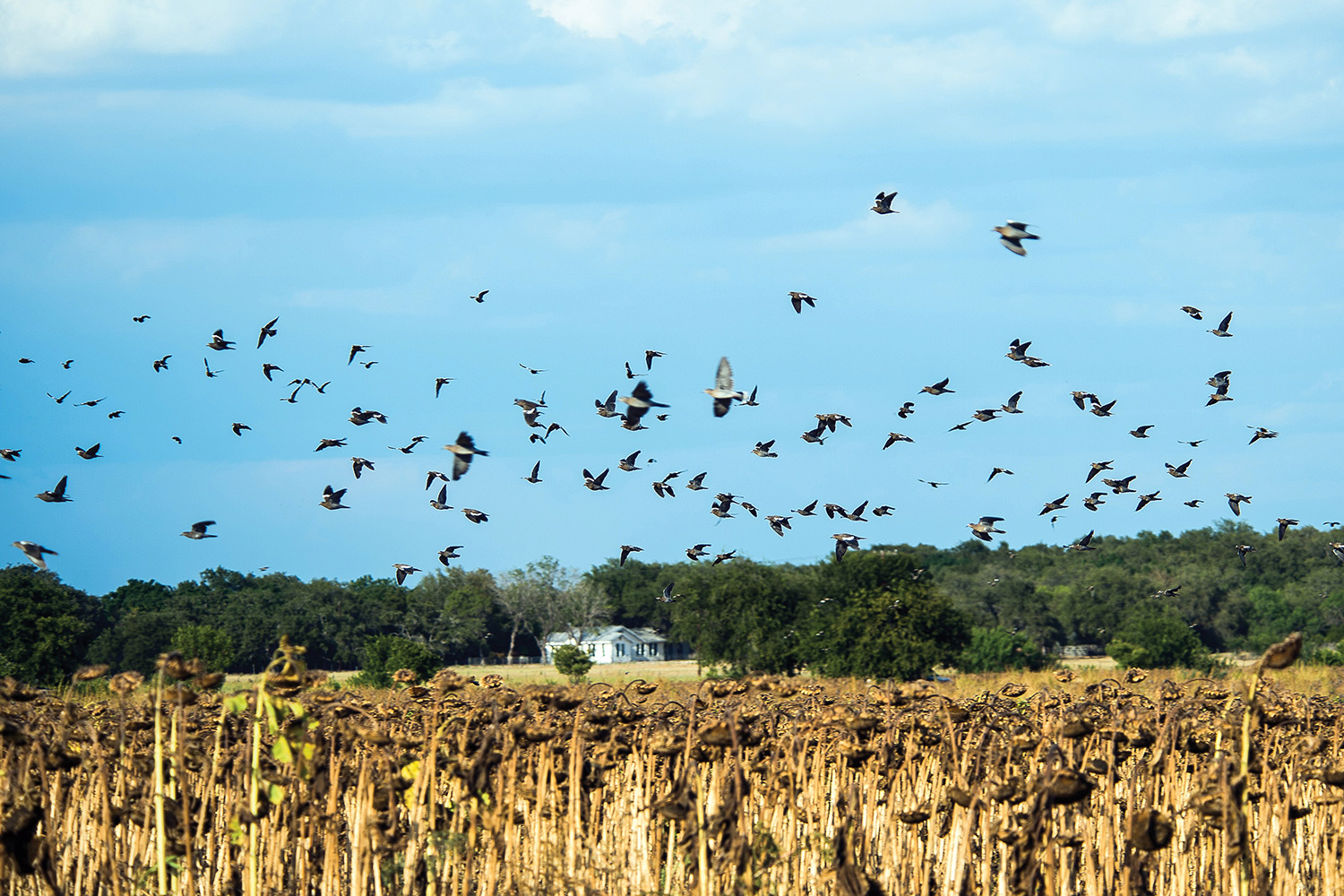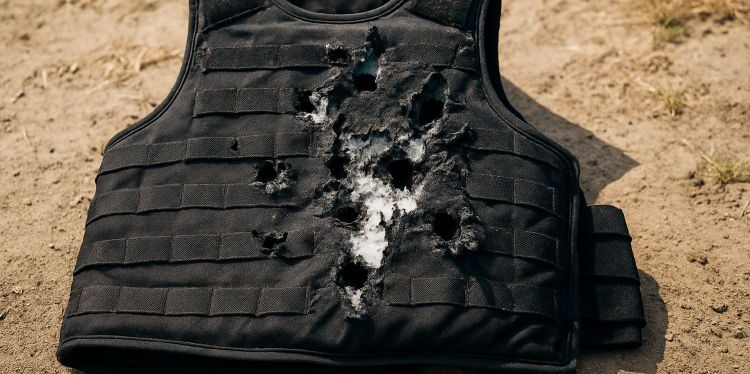Anti-Prepping Laws and How You Can Bend Them
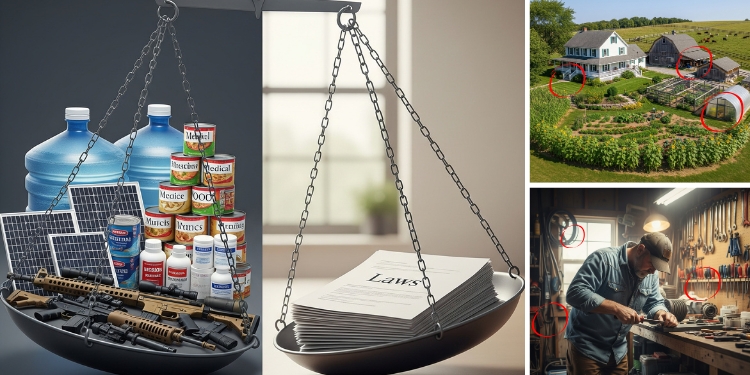
Some states have restrictive laws and regulations that can make it difficult to stockpile resources, collect rainwater, or build off-grid shelters. While these rules may seem like an obstacle to self-sufficiency, there are legal ways to stay prepared without running afoul of the law. Depending on what the law of the land is in your area, the following are some ways to bend anti-prepping laws to your favor without actually breaking the law!
Understand the Anti-Prepping Laws in Your Area
The first step in legally preparing for emergencies while staying legal starts with fully understanding the laws that apply to your state, county, or township. This might include things like:
Limits on Water Collection that regulate or prohibit the collection of things like rainwater, runoff, or creek water. Often, these regulations are in place as the governing body claims that water collection affects natural water rights. Their concern is that if everyone was collecting rainwater, it could affect a drought downstream.
Food Stockpiling Restrictions aren’t uncommon with some homeowner associations. Some towns have local zoning laws that may limit the amount of food storage allowed in residences. These restrictions are often hard to prove as law enforcement can only get a search warrant if there is hard evidence of stockpiling. Otherwise, your Fourth Amendment right to privacy protects you.
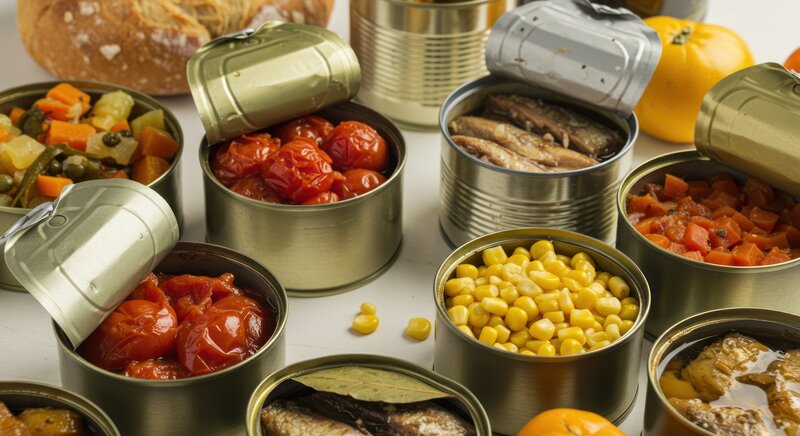
Off-Grid Living Regulations in some urban and suburban areas require homes to be connected to municipal utilities. For the municipal organizations, this makes it easier for them to assess fees and raise property taxes. However, it makes it harder for you to go fully off-grid.
Weapons and Ammunition Limits vary wildly by state, county, and municipality. Most restrict the quantity of ammunition or type of self-defense tools you can own. But here’s the truth: you don’t need firearms to defend your home.
Former CIA Officer Jason Hanson has developed a 100% legal, no-permit-required defense system that any homeowner – including you – can use. Without breaking a single law. It’s called the Anti-Looter Kit, and it’s specifically designed to stop intruders before they ever reach your front door.
Inside the ALK, you’ll find:
-
Tripwire Alarms – trip once, and the whole perimeter lights up
-
Infrared Motion Sensors – detect movement before they detect you
-
Alarmed Door Stoppers – block forced entries instantly
-
Window & Door Alarms – a cheap, loud deterrent that works
-
Fake Security Camera + LED Floodlight – looks real, scares real looters
-
Psychological Deterrents – proven to make criminals think twice
⚠️ Click here to get 50% OFF and secure your home the smart, legal way!
Where to Check for Anti-Prepping Laws
There are several places to check for anti-prepping laws in your area. Remember that if you are in violation, ignorance of the law is technically not considered an excuse. So, if you aren’t sure about a regulation, you should check one or all of the following:
State Government Websites will post specific laws regulating rainwater harvesting. Look for official environmental or water resource agencies
Local Municipal Codes for your city or county may have ordinances related to water collection, zoning, environmental, or building codes. You can usually check your local government’s website or contact them directly.
U.S. Environmental Protection Agency doesn’t directly regulate rainwater harvesting and the collection of other natural resources. However, their website does provide guidelines and links to state regulations for easy research!
State Agricultural Agencies and County Extension Offices will have their own set of posted regulations. If you live in a rural area, these agencies might have relevant restrictions or guidelines.
Homeowners’ Associations might have rules limiting water collection, stockpiling of food, supplies, and ammunition. So, check their bylaws if you live in a governed community.
Working With Rainwater Collection Laws
Even if rainwater collection is restricted in your area, there are still legal ways to store water for emergencies:
 Storing Tap Water is often allowed so long as it’s held in food-grade barrels or containers. Some municipalities have ordinances that require some level of sanitation in the storage containers.
Storing Tap Water is often allowed so long as it’s held in food-grade barrels or containers. Some municipalities have ordinances that require some level of sanitation in the storage containers.
Installing a Well is possible only if local regulations allow it. Having a private well provides a sustainable water source. If it does, you might be able to drive a sand point well as deep as 25 feet. Any deeper than that might require special permits or a contractor. Your county extension office might be able to give you insights on how deep the water table is in your area.
Camouflage Water Collection for gardening is an option in some suburban areas. These regulations often allow water harvesting for gardening but not for drinking. Set up collection barrels disguised as part of your landscaping to gather water within legal limits. Your homeowner’s association might also have rules about the aesthetics of your water collection system.
A Couple of Smart Alternatives
There are alternative methods out there – the kind that can easily fly under the radar without raising any red flags from the feds. If you’re looking for a solution with centuries of proven effectiveness, your best bet is to turn to the Amish. Eddie Swartzentruber is a man who lived in one of the most traditional Amish communities until he was 17. That’s where he learned how to build the “Forever Water Trap” — a device that pulls drinkable water straight from thin air.
Here’s the kicker: this system works even during droughts. Learn how to build it yourself and install it in your vehicle if you ever need to bug out.
Want an even easier option? This backpack-sized water generator could be your survival lifeline. It’s compact, easy to use, and can produce up to 40 gallons of water per day. No grid, no permissions, no reliance on anyone.
Food Stockpiling Strategies That Stay Under the Radar
Food storage is a crucial component of surviving an impending shortage, but in areas with restrictions, discretion is the better part of preparation. There are several ways to stay on the right side of food stockpiling laws or keep them from being noticed.
Rotating Your Pantry Routinely, rather than stockpiling in bulk, ensures a steady rotation of non-perishable goods. You simply buy extra canned and dry goods each time you shop, without drawing attention.
Closing Your Garage Door before unloading your groceries is always wise. Especially if you’re buying in bulk. Legally, your Fourth Amendment right to privacy is in place so long as you aren’t in full public view.
Growing a Garden is always a good idea for maintaining self-sufficiency, and many laws restrict large stockpiles but don’t limit personal gardens. Growing high-calorie crops like potatoes, squash, and beans provides food security without suspicion.
Dehydrating and Vacuum Sealing foods like garden vegetables takes up less space. This makes it easier to store discreetly. It also leaves more room in your storage areas for things like canned goods.
Related: If You Have This In Your Pantry, Throw It Away Immediately
Some Bonus Advice
When it comes to storing your food stockpile, one mistake can ruin everything. Poor storage conditions can waste months’ worth of supplies before you even get the chance to use them. If you want a low-cost, sustainable, and time-tested solution, you need to take a serious look at this practical guide: The Easy Cellar Book.
It shows you how to build your very own root cellar from scratch. No previous experience needed. Written by Tom Griffith, a retired nuclear safety inspector, this guide gives you:
✅ Step-by-step instructions
✅ Clear images and detailed illustrations
✅ Bonus videos to walk you through the entire process
A root cellar doesn’t just preserve food — it can also double as a storm shelter or emergency hideout. And the best part? You can grab the entire system right now for only $37, but only if you order through this link.
Navigating Off-Grid Living Rules
Many municipalities require homes to remain connected to public utilities, making complete off-grid living challenging. However, there are still many ways to legally increase self-sufficiency.
Solar Power as a Supplement will allow you to install solar panels for supplemental energy use. Some modern systems are so efficient that in peak season, you can even sell electricity generated by your home back to the grid. Many counties have programs that can dramatically reduce the initial installation costs. Not only does this improve your energy independence, but it can also save you a lot of money in the long run!
Wood Stoves and Alternative Heating Systems can be a lifesaver when the grid goes down. However, there are legalities at the local level, HOA covenants, and insurance premium costs to consider. These can be extremely arcane in some areas. So, be sure to do your research before you start installing a wood stove.
In most cases, an outdoor wood boiler is easier to get approval for without insurance underwriting. However, the HOA will have their own covenants about chimney height!
Composting Toilets and Greywater Systems help reduce dependence on municipal utilities. Oddly enough, most of these regulations are often governed by the county extension office or the local waterboard under the same rules as septic tanks. If you have an HOA, they might also have covenants against composting toilets, outhouses, and grey water storage tanks.
When they are allowed, you usually have to have wastewater storage tanks in a mound system. This usually includes a drain field that is up to code.
 Portable Generators that run on gasoline, diesel, or propane provide backup power without needing a full off-grid setup. Any regulations here are usually at the municipal level or with your HOA. The triggering problems are often related to visibility and noise levels. Making sure your generator and the connection line are in the backyard and that you have adequate sound baffling should keep you compliant.
Portable Generators that run on gasoline, diesel, or propane provide backup power without needing a full off-grid setup. Any regulations here are usually at the municipal level or with your HOA. The triggering problems are often related to visibility and noise levels. Making sure your generator and the connection line are in the backyard and that you have adequate sound baffling should keep you compliant.
You should also give the Smart Solar Box a chance. Just head over here and discover how more than 17,341 happy families managed to cut power bills by 65% with only a few hours of work.
Securing Self-Defense and Firearm Readiness Legally
Laws surrounding firearms, ammunition, and self-defense weapons vary widely, but there are still legal ways to protect yourself and your home.
Following State and Federal Firearm Laws is an absolute must! Make sure any guns you own comply with legal registration, storage, and carry requirements. Failure to properly register a legal firearm can be considered grounds for a search warrant in some states and municipalities!
Consider Non-Firearm Self-Defense Options with items like pepper spray, tasers, and tactical flashlights. These are often legal alternatives that maintain your ability to defend yourself without giving local law enforcement grounds to search your property.
Training in Hand-to-Hand Self-Defense is always wise. This can include martial arts like jujitsu and aikido or taking a garden variety self-defense course. This will give you the critical skills you should have for personal protection, as well as the confidence that you can handle yourself. So far as I know, there are no legal regulations against self-defense training like this.
Secure Ammunition Properly without excessive stockpiling. Areas that have ammunition stockpiling laws usually have strict limits, and many of the stores that sell ammunition will ask for identification, which could link you to the purchase. So, if you’re buying locally, focus on storing a reasonable amount of ammo in multiple legal locations. If you purchase ammunition out of state, be sure to pay in cash to prevent a direct paper trail to your bank account.
Get Informed because we’re living in a time when government regulations shift constantly, becoming harder and harder to keep up with. And when SHTF, ignorance won’t protect you. If you’re not adjusting properly, you’re vulnerable. That’s why relying on true professionals isn’t just smart. It’s necessary.
I recommend you to rely on professionals like Terry Schappert, a seasoned U.S. Army Special Forces combat veteran. Inside the Home Defense Academy, Terry walks you through the critical tactics every American needs to protect their home in times of crisis.
You’ll uncover field-tested strategies and elite-level techniques designed for real-world threats—information that could mean the difference between survival and disaster.
✅ Is a 3-Letter Agency Tracking You Right Now?
✅ Crazy Looter Deterrents That Will Scare Them Away
✅ How to Avoid Being Targeted During Civil Unrest
✅ How to Make a Green Beret Trip Wire for Your Backyard
✅ Sneaky Inside Secrets to Surviving Martial Law from the People Who Enforce It
✅ Is Your House a Burglar Magnet?
👉Get these 3 Life-Changing Gifts! Only available to the next 12 members!
Use Community and Legal Loopholes to Your Advantage
Many anti-prepping restrictions are designed to target large-scale stockpiling or off-grid independence, with the premise that it could cause a shortage for others.
Joining a Community Garden Association ensures access to fresh food. You can also meet like-minded individuals to build a potential bartering network with later, should something happen in the world.
Embrace Outdoor Hobbies by camping and practicing bushcraft, you’ll develop real-world skills that will help you adapt and overcome. Even in situations where anti-prepping laws have made it impossible to fully stock up a bounty of supplies.
Take Advantage of Legal Exemptions. Some areas have allowances for religious, agricultural, or scientific purposes that may allow for more flexibility.
One Last Thing
When disaster strikes, your home becomes your battlefield. If you think you’ll be able to improvise once chaos erupts — think again. Desperate people make dangerous choices, and FEMA won’t be there to save you.
That’s why The Navy SEAL’s Bug-In Guide is more than just a survival book. It’s your blueprint for building a legally sound, low-profile defense plan that can keep your family fed, secure, and out of harm’s way.
Written by former Navy SEAL Joel Lambert, this hands-on manual teaches you how to fortify your home, store critical supplies without raising red flags, and outmaneuver the government’s ever-tightening grip — all while staying under the radar or one step ahead of the law.
Inside, you’ll learn:
-
How to turn your home into a stealth survival fortress without tipping off your neighbors
-
Legal loopholes and tactics to outfox FEMA and avoid confiscation of food, water, or gear
-
How to build a covert stockpile that no one — not even inspectors — will know about
-
Where to hide your backup electronics, food, and weapons so they can’t be tracked, seized, or taxed
-
The 3 fatal prepper mistakes that turn homes into soft targets — and how to avoid every one of them
-
Battle-tested strategies to maintain power, communication, and protection even if the grid stays down for months
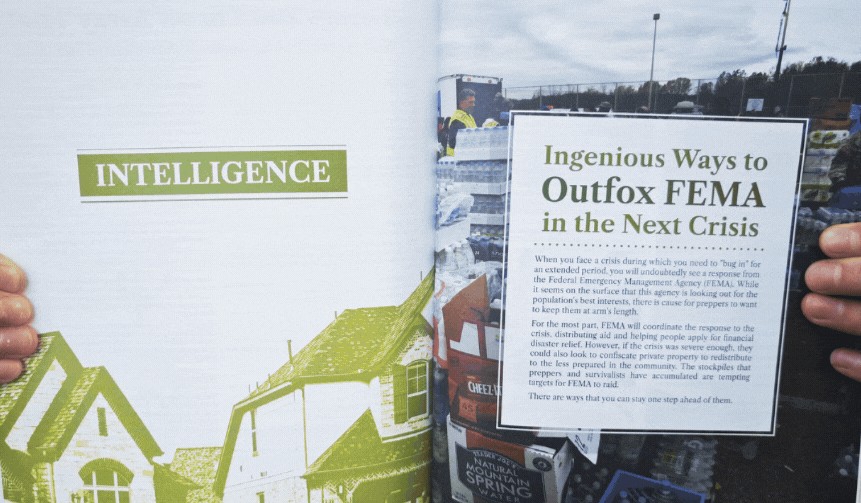
This is not a government-approved survival pamphlet. It’s a hard-earned survival playbook, built from real-life military experience and adapted to give everyday Americans an edge.
⚠️ Grab Joel’s 68% OFF exclusive offer while supplies last. Only a limited print run exists!
Final Thoughts on Anti-Prepping Laws and How To Bend Them
Anti-prepping laws may create obstacles, but they don’t make preparedness impossible. By working within legal boundaries, staying discreet, and thinking creatively, you can build a solid emergency plan without risking fines or legal trouble. Remember, the goal isn’t just to optimize your survival chances by bending anti-prepping laws without overtly breaking them.
You may also like:

Stand Your Ground Law: 5 Things Every Prepper Should Know
The Hidden Food Growing Fence (Video)
Prepare for Confiscation: Items the Government Will Be After
Off-Grid Tools You Need To Have On Your Property
Read the full article here





